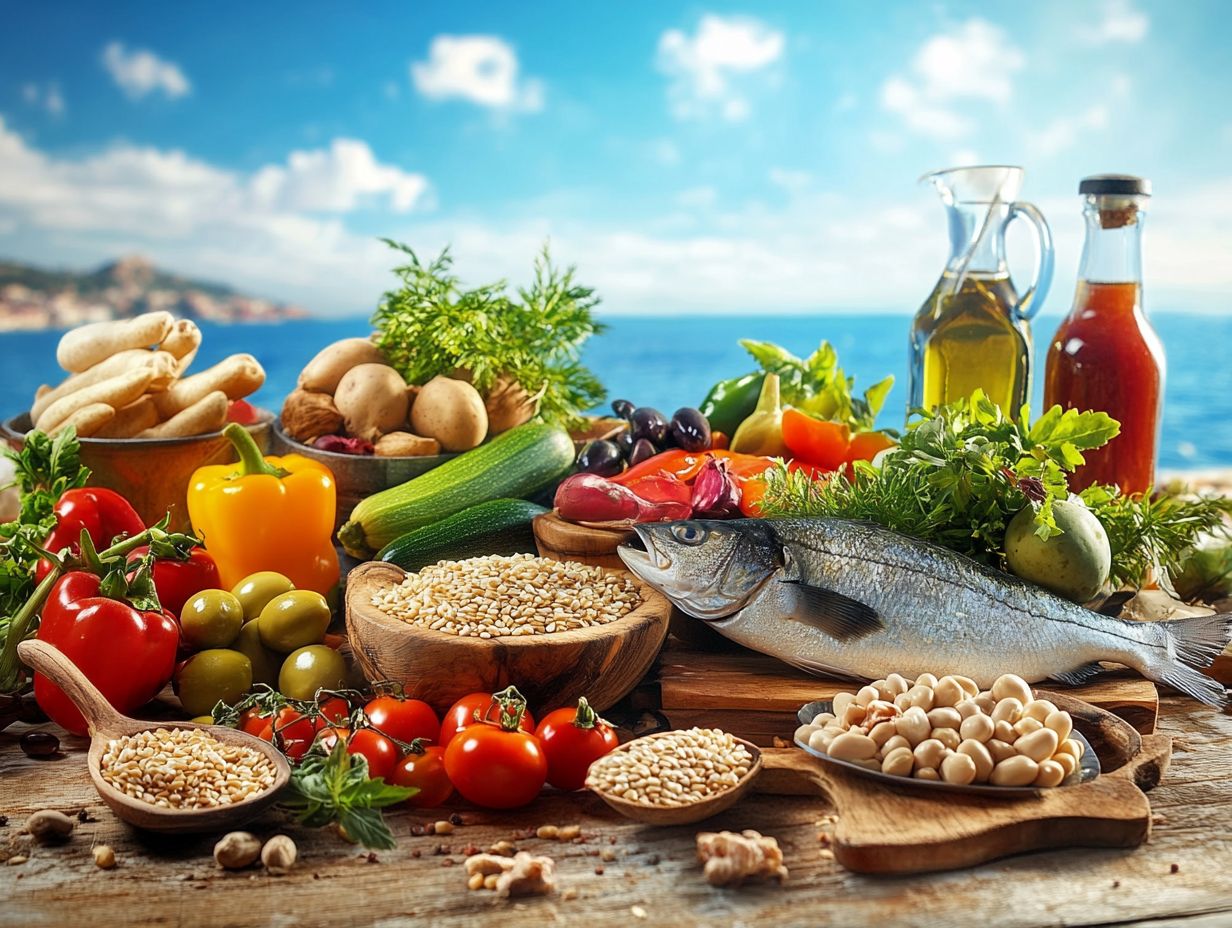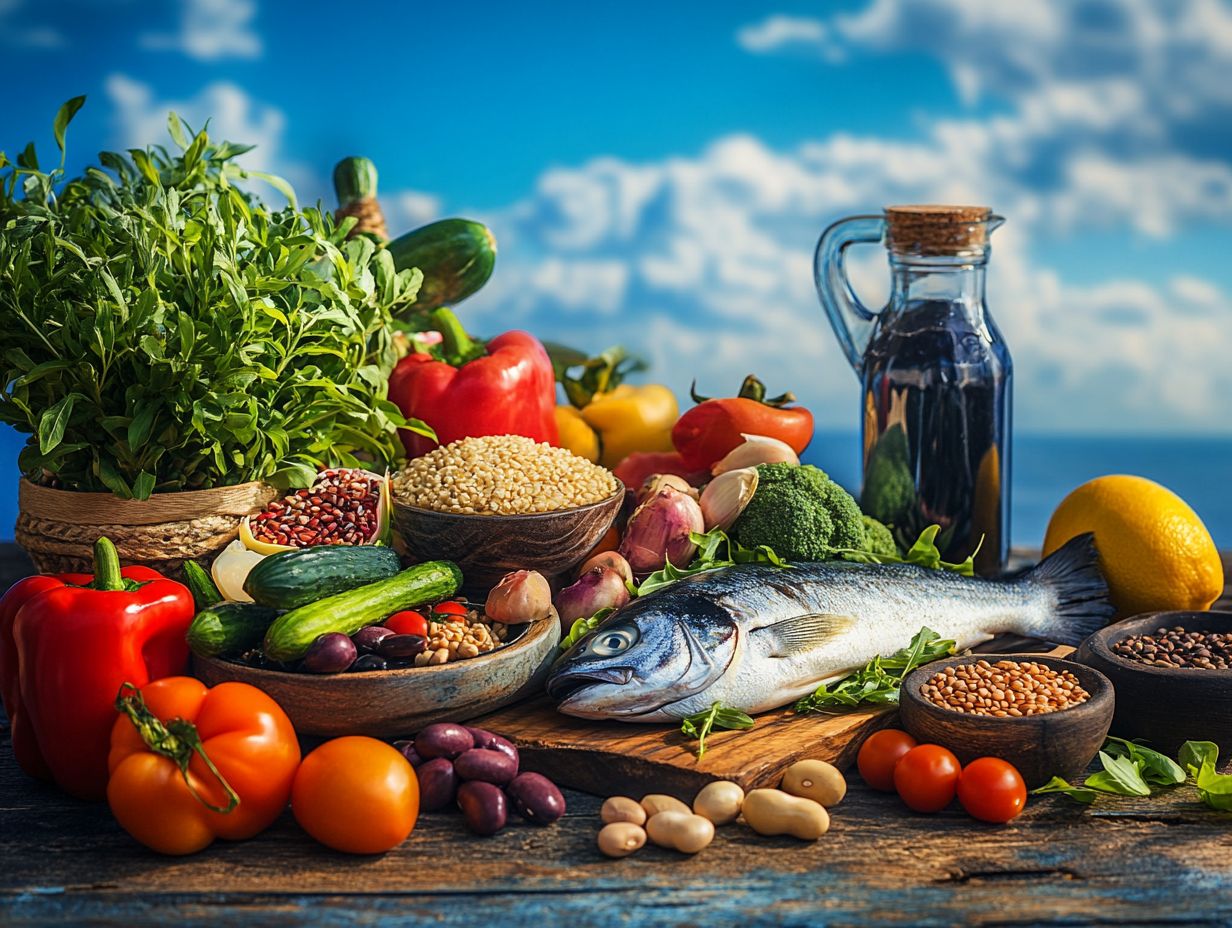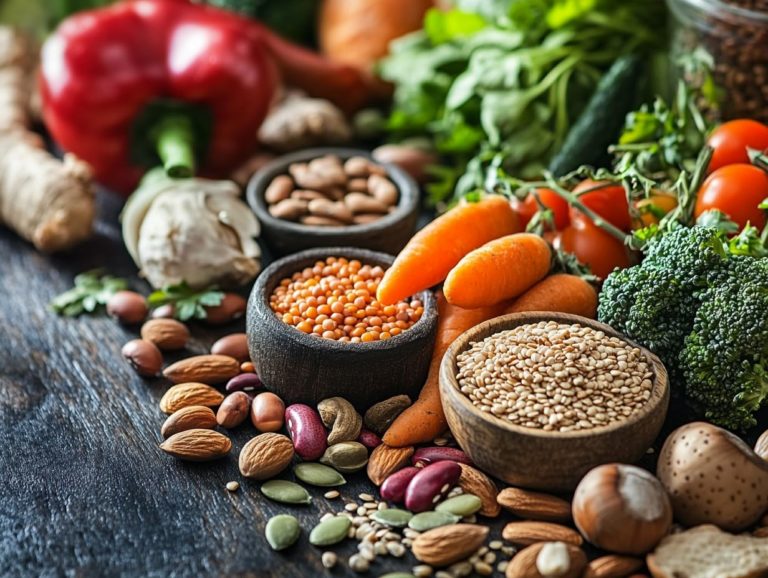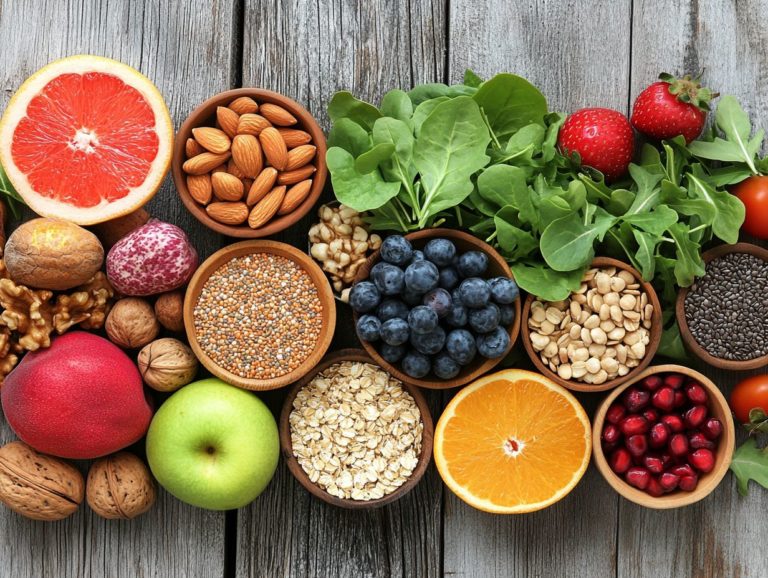5 Best Sources of Nutrients in the Mediterranean Diet
The Mediterranean diet is not merely a way of eating; it embodies a lifestyle brimming with flavor, nutrients and remarkable health benefits.
This diet highlights five essential sources of nourishment: olive oil, fish and seafood, fruits and vegetables, whole grains and nuts and seeds, creating a veritable powerhouse for your well-being.
You ll explore its distinctive advantages, draw comparisons with other dietary options and receive valuable tips for seamlessly integrating these wholesome foods into your daily routine.
We will clarify common misconceptions and discover a treasure trove of delicious recipes. Immerse yourself and uncover how the Mediterranean diet can elevate your health!
Contents
- Illustrating Key Takeaways!
- 1. Olive Oil
- 2. Fish and Seafood
- 3. Fruits and Vegetables
- 4. Whole Grains
- 5. Nuts and Seeds
- What Is the Mediterranean Diet and Its Benefits?
- Frequently Asked Questions
- What are the 5 best sources of nutrients in the Mediterranean Diet?
- Why are fruits a top source of nutrients in the Mediterranean Diet?
- How do vegetables contribute to the Mediterranean Diet’s nutritious benefits?
- What makes whole grains vital in the Mediterranean Diet?
- Why are legumes considered excellent nutrients in the Mediterranean Diet?
- How do healthy fats enhance the Mediterranean Diet?
Illustrating Key Takeaways!

- Olive oil is a key component, providing healthy fats and antioxidants.
- Fish and seafood supply protein and omega-3 fatty acids, promoting heart health.
- Fruits and vegetables offer essential vitamins, minerals and fiber for overall health.
1. Olive Oil
Olive oil stands as a cornerstone of the Mediterranean diet, celebrated for its robust flavor and health benefits, especially in supporting heart health.
This healthy fat, rich in antioxidants, complements a balanced diet that showcases traditional Mediterranean flavors, making it essential in kitchens throughout the region.
Nutrition experts highlight its anti-inflammatory properties and potential to reduce the risk of chronic diseases.
You ll find various types of olive oil extra virgin, virgin and light each with unique processing methods and flavor profiles. Extra virgin olive oil retains the highest levels of antioxidants and is often recommended for salads, drizzling over vegetables or low-heat cooking.
Health organizations like the American Heart Association advocate for incorporating this nutrient-dense fat into daily meals to boost overall health. By choosing olive oil as your primary source of dietary fat, you promote cardiovascular wellness while elevating your culinary experience.
2. Fish and Seafood
Fish and seafood are essential elements, celebrated not just for their flavors but also for their rich omega-3 fatty acids, crucial for heart health.
Among the diverse selection, salmon and sardines shine for their taste and availability. These options can be grilled, baked, saut ed or poached, inviting culinary creativity.
Consider indulging in grilled sardines, drizzled with olive oil and sprinkled with sea salt to let their natural flavors shine.
Alternatively, a simple salmon fillet, baked with fresh herbs and zesty lemon, provides delightful taste and beneficial fatty acids.
Incorporating seafood into your meals elevates any Mediterranean-inspired dining experience.
3. Fruits and Vegetables
Fruits and vegetables lie at the core of the Mediterranean diet, offering essential nutrients, fiber and antioxidants that enhance overall health while encouraging healthy eating habits.
This vibrant cuisine showcases seasonal produce, including tomatoes, cucumbers, and bell peppers, brimming with vitamins that support gut health.
Leafy greens like spinach and kale serve as rich fiber sources, aiding digestion and promoting fullness.
Seasonal fruits, such as figs, melons and citrus, provide refreshing flavors, hydration and vital nutritional benefits.
By incorporating these colorful ingredients into family meals through salads, stir-fries or simple sides you can transform nutritious eating into a delightful experience, fostering a lifelong appreciation for wholesome foods.
Start your Mediterranean journey today!
4. Whole Grains

Whole grains play a vital role in the Mediterranean diet. They are celebrated for their high fiber content and ability to support healthy eating patterns, lower cholesterol, and provide lasting energy throughout the day.
Grains like bulgur, farro, and quinoa not only enhance the flavor of your meals but also come packed with health benefits.
Take bulgur, for instance. This quick-cooking grain, made from whole wheat, is rich in vitamins and minerals, making it a fantastic addition to salads or a delightful side dish.
Then there’s farro, known for its chewy texture and nutty flavor. It pairs beautifully in soups or grain bowls, serving as a hearty base for family gatherings.
By incorporating these whole grains into your cooking, you enhance your nutrition and create opportunities for your family to bond over healthy, flavorful meals.
5. Nuts and Seeds
Nuts and seeds are essential elements of the Mediterranean diet. They are packed with healthy fats, protein, and fiber. These snacks enhance flavor, promote heart health, and provide anti-inflammatory benefits.
Among the variety found in this cooking style, almonds, walnuts, pistachios, chia seeds, and flaxseeds stand out. Each has its own unique nutrients, contributing to lower cholesterol and better digestive health.
To easily add these nutritious gems to your routine, consider:
- Sprinkling them on salads
- Blending them into smoothies
- Using them in homemade granola
Incorporating a handful as a mid-afternoon snack or spreading nut butter on toast is a practical way to enjoy their benefits. You can also savor the rich flavors of Mediterranean cuisine.
What Is the Mediterranean Diet and Its Benefits?
The Mediterranean diet isn t just a diet; it s a lifestyle rooted in the cooking styles of countries along the Mediterranean Sea. It invites you to enjoy a vibrant array of plant-based foods, healthy fats, lean proteins, and moderate servings of dairy and red wine all aimed at improving heart health, promoting longevity, and enhancing your overall well-being.
This approach is endorsed by nutrition experts and health organizations like the American Heart Association and the World Health Organization.
This diet truly celebrates whole grains, fresh fruits, and vegetables, delivering essential nutrients while avoiding processed foods and added sugars. It embraces healthy fats like olive oil and nuts, known for reducing inflammation and improving cholesterol levels.
Research links this diet to preventing heart disease through beneficial fats and aiding in weight loss by increasing fullness. Studies also connect this diet to better gut health due to its generous fiber content, which nourishes good gut bacteria and supports overall well-being.
How Does the Mediterranean Diet Compare to Other Diets?
The Mediterranean diet stands out among various dietary approaches, like the DASH diet, because it emphasizes whole, minimally processed foods. This focus makes it appealing for anyone seeking healthful eating patterns that prioritize heart health and longevity.
This diet is rich in fruits, vegetables, whole grains, nuts, and healthy fats like olive oil, making it delicious and nutritious.
In contrast, the DASH diet targets high blood pressure by promoting lower sodium intake and encouraging lean proteins and low-fat dairy. While both diets focus on whole foods, the Mediterranean approach offers greater flexibility and enjoyment, often including local wines and a variety of fish.
For those with active lifestyles or anyone seeking sustainable eating habits, the Mediterranean diet provides a more adaptable framework. The DASH diet may be better suited for individuals with specific health concerns requiring stricter guidelines.
Each diet has unique health benefits, so it s crucial to choose the one that best aligns with your personal health journey.
What Are the Key Nutrients in the Mediterranean Diet?

The Mediterranean diet brims with essential nutrients, such as healthy fats found in fish that support heart health, fiber from whole grains and legumes, and antioxidants from fresh fruits and vegetables. Each element contributes to its esteemed health benefits.
These components work together to bolster heart health by lowering cholesterol levels and reducing blood pressure. The anti-inflammatory properties of omega-3s can help alleviate chronic inflammation, a common precursor to various diseases.
By incorporating a diverse array of these foods into your meals, you can support your immune system and enhance your overall well-being. Healthy fats, like those found in olive oil and nuts, not only elevate the flavor of your dishes but also aid in the absorption of fat-soluble vitamins.
This approach to eating represents a holistic path to wellness, nourishing your body from the inside out.
How Can One Incorporate the Mediterranean Diet into Their Lifestyle?
Incorporating the Mediterranean diet into your lifestyle means making simple yet impactful changes. Focus on fresh, seasonal foods, choose healthy fats like olive oil, and enjoy shared meals with family to cultivate healthy habits and connections.
To truly embrace this way of eating, consider crafting a weekly meal plan that showcases vibrant vegetables, whole grains, and lean proteins. This approach simplifies preparing wholesome dishes that can be savored together.
Easy-to-follow recipes, such as a classic Greek salad or grilled fish with herbs, can ignite creativity while keeping meal prep a breeze.
Creating a supportive environment is crucial; involve your family in cooking and shopping to instill good habits. Encourage open conversations about nutrition, and celebrate the joy of sharing meals. This transforms healthy eating from a chore into a delightful routine that everyone can enjoy.
What Are Some Delicious Mediterranean Diet Recipes?
Delicious Mediterranean diet recipes are abundant, offering you a vibrant array of plant foods, lean proteins, and healthy fats that tantalize your taste buds while promoting heart health and overall wellness through mindful eating.
The essence of this cuisine captures the spirit of the region, celebrating fresh ingredients like ripe tomatoes, fragrant herbs, and nutrient-rich olives.
By incorporating seasonal produce, these recipes highlight the best flavors and encourage sustainable eating habits, making each meal a step toward a more eco-friendly lifestyle.
Traditional cooking techniques, such as grilling and slow-roasting, enhance the natural aromas and textures, transforming your dining experience into something satisfying and nourishing.
As you explore these recipes, you’ll embrace a lifestyle rich in color, taste, and a multitude of health benefits, inviting a deeper connection to food and well-being. Try these delicious recipes to bring the Mediterranean flavors to your table!
What Are Some Common Misconceptions About the Mediterranean Diet?
Despite its rising popularity, numerous misconceptions about the Mediterranean diet linger, often leading to confusion about its core principles and the types of foods essential for healthy eating and lifestyle changes.
You might think this diet demands the elimination of entire food groups, but that couldn’t be further from the truth. The Mediterranean approach promotes balance and variety, encouraging you to enjoy whole grains, fresh fruits and vegetables, healthy fats like olive oil, and even moderate amounts of dairy.
One prevalent misunderstanding is the role of red wine. While it can certainly be part of the experience, moderation is crucial and should never overshadow the other vital components of your diet.
This eating pattern actively discourages processed foods, reinforcing its commitment to whole, nutrient-dense ingredients that foster long-term health and well-being.
Frequently Asked Questions

What are the 5 best sources of nutrients in the Mediterranean Diet?
The 5 best sources of nutrients in the Mediterranean Diet are fruits, vegetables, whole grains, legumes, and healthy fats.
Why are fruits a top source of nutrients in the Mediterranean Diet?
Fruits are packed with vitamins, minerals, and antioxidants. These elements promote overall health and help prevent chronic diseases.
How do vegetables contribute to the Mediterranean Diet’s nutritious benefits?
Vegetables offer essential nutrients like fiber, vitamins, and minerals. They are low in calories, making them perfect for weight management.
What makes whole grains vital in the Mediterranean Diet?
Whole grains, such as brown rice and whole wheat bread, are rich in fiber and B vitamins. They help keep your blood sugar levels stable, making them a healthier choice.
Why are legumes considered excellent nutrients in the Mediterranean Diet?
Legumes like beans, lentils, and chickpeas are fantastic sources of plant-based protein and fiber. They are also budget-friendly and accessible for everyone.
How do healthy fats enhance the Mediterranean Diet?
Healthy fats from olive oil, nuts, and fatty fish are essential. They provide vital fatty acids that support heart health and overall well-being.






